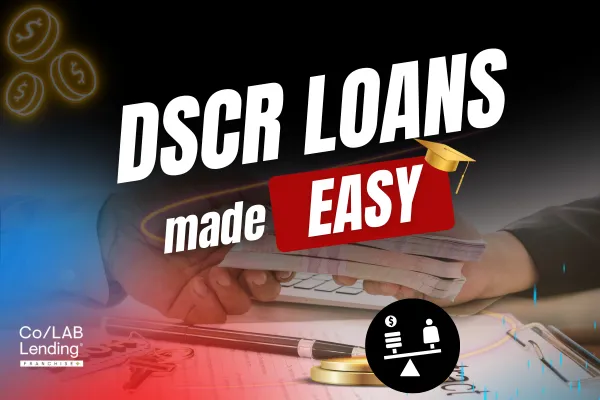BLOG
Mortgage, Real Estate, and Entrepreneurship


How to Originate DSCR Loans in 2025: A Step-by-Step Guide for Mortgage Brokers
How to Originate DSCR Loans in 2025: A Step-by-Step Guide for Mortgage Brokers
If you're a mortgage broker or loan officer looking to dominate a profitable niche in 2025, there's one acronym you need to know: DSCR — Debt Service Coverage Ratio. Whether you’re drowning in paperwork, frustrated with capped commissions, or just looking for a smarter, faster way to close more deals, DSCR loans might just be your golden ticket.
In this detailed guide, I’ll walk you through exactly how to originate DSCR loans, even if you’re not licensed in every state. You’ll learn why this niche is booming, why mortgage brokers are uniquely positioned to win, and what it takes to start closing more deals with real estate investors — step by step.
Why DSCR Loans Are Red-Hot in 2025
Let’s start with the basics. Why should you care about DSCR loans?
Simple: investors are dominating the market.
More than 18% to 25% of all 1–4 unit homes purchased in the U.S. this year are being bought by real estate investors. Compare that to just 13% pre-pandemic, and you’ll see why this niche is exploding.
And here’s the kicker — most loan officers aren’t paying attention.
Think about it: how many loan officers do you know who actively market to real estate investors? Probably not many. That’s your opportunity. If you're looking for a profitable, underserved market with lower documentation and faster closings, DSCR loans are the answer.
Why Mortgage Brokers Win Big with DSCR Loans
If you want to originate DSCR loans successfully, you need to do it as a mortgage broker — not in retail.
Here’s why:
Lender Flexibility: DSCR guidelines vary widely. Some lenders allow gift funds, others don’t. Some require 25% down, others accept 15%. As a broker, you can shop around for the best options.
No NMLS in Every State Needed: You can originate non-owner-occupied DSCR loans in most states even if you’re not licensed there. If you're licensed in Pennsylvania and Ohio, for instance, you can still do loans in states like Texas, Mississippi, and North Carolina.
Easier Processing: DSCR loans are simpler to process. No need to verify borrower income — it’s all about the property’s income.
In retail? You’re often stuck with one or two DSCR products, leading to last-minute issues and loan fallout. Brokers have access to 10, 15, even 20 DSCR lenders. That flexibility is key.
Step-by-Step: How to Start Originating DSCR Loans
Ready to get started? Here’s exactly how to break into the DSCR loan space and become an expert:
1. Educate Yourself on DSCR Basics
DSCR = Debt Service Coverage Ratio. Instead of focusing on the borrower's income, lenders look at how much income the property generates compared to its debt.
Think of it like this: If the rent covers the mortgage payment, you’ve got a deal.
You need to understand:
How to calculate the DSCR ratio (net operating income ÷ debt service)
Typical thresholds (1.00 is usually the minimum)
Terms: LTV limits, interest-only options, prepayment penalties
Required docs: lease agreements, rent schedule, property operating statements
2. Understand Entity Structures
Most investors buy properties through LLCs. That means you need to understand how to structure loans for entities — not just individuals.
Ask yourself:
Does your lender allow LLCs?
Can they do non-recourse loans?
Do they allow title to vest in an entity at closing?
3. Sign Up with 5+ DSCR-Focused Lenders
Don’t just work with your go-to A-paper lender. You need specialized DSCR lenders with diverse products:
One lender might allow Airbnb and short-term rentals
Another might offer 15% down payment
A third may offer non-recourse loans for LLCs
A fourth could allow gift funds or seller credits
Diversify your lender panel so you’re never boxed in.
4. Meet with Account Executives
Set up Zoom calls. Ask about:
Loan guidelines
Eligible property types
Minimum DSCR thresholds
Prepayment penalties
Compensation structure
Licensing requirements per state
Make sure you know what you can legally offer and quote clients accurately.
5. Be Proactive with the Appraisal Rent Schedule
This is where many DSCR loans go sideways. The rent schedule in the appraisal can make or break your deal.
What to do:
Talk to the listing agent or seller to get real rent comps
Send those comps to the appraiser
Build a step into your process so your team always checks the rent schedule before closing
This one step can be the difference between a loan that closes and a loan that dies.
Marketing & Lead Gen: Get Clients, Not Crickets
Let’s be real: being great at DSCR loans won’t matter if no one knows you exist.
Here’s how to build a strong pipeline:
Start a YouTube Channel
Post videos about:
DSCR loan myths
Case studies with investors
Market updates and rent trends
Run Paid Ads
Target flippers, landlords, and out-of-state investors using Facebook, Google, or Instagram ads.
Attend Investor Meetups
Nothing beats in-person networking. Go where investors are — real estate clubs, REIAs, conferences.
Offer Free Education
Host webinars or free guides on:
“How to Buy Your First Investment Property Without Tax Returns”
“DSCR Loans 101 for Busy Real Estate Investors”
The key? Position yourself as the go-to DSCR expert.
Recap: Why You Should Start Originating DSCR Loans Now
Here’s what you need to remember:
Investor loans are growing fast — 18% to 25% of the market.
Mortgage brokers dominate this niche, not retail loan officers.
You can originate in multiple states without multiple licenses.
DSCR loans are faster, easier, and more flexible than traditional loans.
With the right lender panel, training, and marketing strategy, you can build a six- or even seven-figure business in this niche.
Ready to Take Action?
If you're serious about building a DSCR loan business that gives you freedom, flexibility, and consistent closings, don’t do it alone.
At Co/LAB, we offer:
Done-for-you systems
Access to top DSCR lenders
Weekly training and support
Lead generation blueprints
👉 Click here to book a strategy call and discover how to scale your business as a mortgage broker specializing in DSCR loans.
Frequently Asked Questions About DSCR Loans
1. What does DSCR stand for in real estate lending?
DSCR stands for Debt Service Coverage Ratio. It's a key metric lenders use to evaluate whether a property's income is sufficient to cover its mortgage payments. It’s calculated by dividing the property's monthly rental income by the monthly mortgage payment (PITIA). A DSCR of 1.0 means the property breaks even; over 1.0 indicates positive cash flow.
2. Do I need an NMLS license to originate DSCR loans?
In most cases, you do not need to be licensed in every state to originate DSCR loans—as long as the property is non-owner occupied (i.e., for investment purposes). These are considered business-purpose loans, so they're often exempt from traditional NMLS licensing requirements in many states.
3. What credit score is needed for a DSCR loan?
While it varies by lender, most DSCR lenders look for a minimum credit score of 620–660. However, some may require higher scores depending on the LTV (loan-to-value) ratio, property type, or DSCR threshold.
4. Can a first-time investor qualify for a DSCR loan?
Yes, some DSCR lenders allow first-time investors to purchase a rental property—even if they have no prior real estate ownership. This is not true for every lender, so it’s crucial to work with lenders who specialize in this niche.
5. How much down payment is required for a DSCR loan?
Down payment requirements typically range from 15% to 25%, depending on the lender and property type. Some lenders may allow gift funds or equity from other properties to be used as part of the down payment.
6. What documentation is needed for DSCR loans?
DSCR loans are known for their reduced documentation requirements. Instead of personal income verification, you’ll need:
Lease agreements or rent roll
Appraisal with 1007 rent schedule
Operating income statements
Entity documentation (if buying under an LLC)
This makes the process smoother, especially for self-employed or unconventional borrowers.
7. Are DSCR loans available for short-term rentals (Airbnb, VRBO)?
Yes, some lenders offer DSCR loan programs tailored to short-term rentals. These may use projected income based on platforms like Airbnb or a market rent analysis. Be sure to work with lenders who explicitly underwrite for short-term rental income.
8. Can I refinance an existing investment property using a DSCR loan?
Absolutely. Many investors use DSCR loans to refinance rental properties, especially when they want to cash out equity or move away from traditional underwriting criteria.
9. What’s the average interest rate on a DSCR loan?
Rates on DSCR loans are generally higher than conventional loans, typically 1-2% higher, to offset the risk of non-owner-occupied properties. Rates fluctuate based on the DSCR, credit score, and loan term.
10. Are DSCR loans recourse or non-recourse?
Both options exist. Non-recourse DSCR loans protect the investor's personal assets in case of default, but they often come with stricter qualifications. Be sure to confirm loan terms with your lender before committing.
Final Thoughts and Next Steps
DSCR loans are one of the most powerful and scalable financing tools available to mortgage brokers and real estate professionals today. If you're serious about building a thriving business in 2025, leaning into this niche could set you apart from your competition.
✅ They require less paperwork.
✅ You can originate them in multiple states without multiple licenses.
✅ The demand is surging, and investor clients are actively searching for loan officers who “get” their world.
So—don’t wait for someone else to dominate your market. Be the go-to DSCR expert in your region. Build your lender panel, sharpen your knowledge, and promote your services.
If you're ready to dive deeper, book a strategy call today to learn how you can join a brokerage that offers ready-made lender relationships, done-for-you operations, and mentorship from experts who’ve closed hundreds of DSCR loans.
Want help getting started with DSCR loans?
👉 Book a Free Strategy Call with Us
👉 Subscribe to our YouTube Channel for Weekly Videos
👉 Become A Member of The Lab Community
Megan Marsh
Founder, Co/LAB Broker Concierge
In Case You Missed Our Previous Blogs & YouTube Videos..
Read Here: The Ultimate Guide to Loan Officer Training: Build Your Career, Skills, and Business
Struggling to grow as a loan officer? The Ultimate Guide to Loan Officer Training is your all-in-one roadmap to building a successful, profitable career in the mortgage industry. From passing the NMLS exam to mastering advanced lending and marketing strategies, this guide covers every stage of your journey—whether you're just starting out or looking to scale your business. Unlock the skills, tools, and confidence you need to thrive, not just survive.
Read here: The 10 Hardest States to Start a Mortgage Company (And How to Navigate Them)
Thinking of starting your own mortgage company? This blog breaks down the toughest states for licensing—and what makes them so challenging. From sky-high net worth requirements to grueling approval timelines, this guide reveals what to expect and how to overcome the obstacles. Whether you're in New York, California, or anywhere in between, you'll get expert strategies to help you launch your business with confidence—even in the most restrictive markets.
Mortgage Broker Support
Need help starting your mortgage business? Our Mortgage Broker Concierge Team is here to assist you!
If you’re curious about how we can help you simplify your operations beyond what our videos offer and want to know how you can make launching or running your brokerage stress-free, the link below explains everything. No fluff, no “exclusive training” gimmicks—just a straightforward way to see how we work with brokers to take backend tasks off their plates. Check it out here: https://colablendingfranchise.com/book-a-discovery-call

How to Originate DSCR Loans in 2025: A Step-by-Step Guide for Mortgage Brokers
How to Originate DSCR Loans in 2025: A Step-by-Step Guide for Mortgage Brokers
If you're a mortgage broker or loan officer looking to dominate a profitable niche in 2025, there's one acronym you need to know: DSCR — Debt Service Coverage Ratio. Whether you’re drowning in paperwork, frustrated with capped commissions, or just looking for a smarter, faster way to close more deals, DSCR loans might just be your golden ticket.
In this detailed guide, I’ll walk you through exactly how to originate DSCR loans, even if you’re not licensed in every state. You’ll learn why this niche is booming, why mortgage brokers are uniquely positioned to win, and what it takes to start closing more deals with real estate investors — step by step.
Why DSCR Loans Are Red-Hot in 2025
Let’s start with the basics. Why should you care about DSCR loans?
Simple: investors are dominating the market.
More than 18% to 25% of all 1–4 unit homes purchased in the U.S. this year are being bought by real estate investors. Compare that to just 13% pre-pandemic, and you’ll see why this niche is exploding.
And here’s the kicker — most loan officers aren’t paying attention.
Think about it: how many loan officers do you know who actively market to real estate investors? Probably not many. That’s your opportunity. If you're looking for a profitable, underserved market with lower documentation and faster closings, DSCR loans are the answer.
Why Mortgage Brokers Win Big with DSCR Loans
If you want to originate DSCR loans successfully, you need to do it as a mortgage broker — not in retail.
Here’s why:
Lender Flexibility: DSCR guidelines vary widely. Some lenders allow gift funds, others don’t. Some require 25% down, others accept 15%. As a broker, you can shop around for the best options.
No NMLS in Every State Needed: You can originate non-owner-occupied DSCR loans in most states even if you’re not licensed there. If you're licensed in Pennsylvania and Ohio, for instance, you can still do loans in states like Texas, Mississippi, and North Carolina.
Easier Processing: DSCR loans are simpler to process. No need to verify borrower income — it’s all about the property’s income.
In retail? You’re often stuck with one or two DSCR products, leading to last-minute issues and loan fallout. Brokers have access to 10, 15, even 20 DSCR lenders. That flexibility is key.
Step-by-Step: How to Start Originating DSCR Loans
Ready to get started? Here’s exactly how to break into the DSCR loan space and become an expert:
1. Educate Yourself on DSCR Basics
DSCR = Debt Service Coverage Ratio. Instead of focusing on the borrower's income, lenders look at how much income the property generates compared to its debt.
Think of it like this: If the rent covers the mortgage payment, you’ve got a deal.
You need to understand:
How to calculate the DSCR ratio (net operating income ÷ debt service)
Typical thresholds (1.00 is usually the minimum)
Terms: LTV limits, interest-only options, prepayment penalties
Required docs: lease agreements, rent schedule, property operating statements
2. Understand Entity Structures
Most investors buy properties through LLCs. That means you need to understand how to structure loans for entities — not just individuals.
Ask yourself:
Does your lender allow LLCs?
Can they do non-recourse loans?
Do they allow title to vest in an entity at closing?
3. Sign Up with 5+ DSCR-Focused Lenders
Don’t just work with your go-to A-paper lender. You need specialized DSCR lenders with diverse products:
One lender might allow Airbnb and short-term rentals
Another might offer 15% down payment
A third may offer non-recourse loans for LLCs
A fourth could allow gift funds or seller credits
Diversify your lender panel so you’re never boxed in.
4. Meet with Account Executives
Set up Zoom calls. Ask about:
Loan guidelines
Eligible property types
Minimum DSCR thresholds
Prepayment penalties
Compensation structure
Licensing requirements per state
Make sure you know what you can legally offer and quote clients accurately.
5. Be Proactive with the Appraisal Rent Schedule
This is where many DSCR loans go sideways. The rent schedule in the appraisal can make or break your deal.
What to do:
Talk to the listing agent or seller to get real rent comps
Send those comps to the appraiser
Build a step into your process so your team always checks the rent schedule before closing
This one step can be the difference between a loan that closes and a loan that dies.
Marketing & Lead Gen: Get Clients, Not Crickets
Let’s be real: being great at DSCR loans won’t matter if no one knows you exist.
Here’s how to build a strong pipeline:
Start a YouTube Channel
Post videos about:
DSCR loan myths
Case studies with investors
Market updates and rent trends
Run Paid Ads
Target flippers, landlords, and out-of-state investors using Facebook, Google, or Instagram ads.
Attend Investor Meetups
Nothing beats in-person networking. Go where investors are — real estate clubs, REIAs, conferences.
Offer Free Education
Host webinars or free guides on:
“How to Buy Your First Investment Property Without Tax Returns”
“DSCR Loans 101 for Busy Real Estate Investors”
The key? Position yourself as the go-to DSCR expert.
Recap: Why You Should Start Originating DSCR Loans Now
Here’s what you need to remember:
Investor loans are growing fast — 18% to 25% of the market.
Mortgage brokers dominate this niche, not retail loan officers.
You can originate in multiple states without multiple licenses.
DSCR loans are faster, easier, and more flexible than traditional loans.
With the right lender panel, training, and marketing strategy, you can build a six- or even seven-figure business in this niche.
Ready to Take Action?
If you're serious about building a DSCR loan business that gives you freedom, flexibility, and consistent closings, don’t do it alone.
At Co/LAB, we offer:
Done-for-you systems
Access to top DSCR lenders
Weekly training and support
Lead generation blueprints
👉 Click here to book a strategy call and discover how to scale your business as a mortgage broker specializing in DSCR loans.
Frequently Asked Questions About DSCR Loans
1. What does DSCR stand for in real estate lending?
DSCR stands for Debt Service Coverage Ratio. It's a key metric lenders use to evaluate whether a property's income is sufficient to cover its mortgage payments. It’s calculated by dividing the property's monthly rental income by the monthly mortgage payment (PITIA). A DSCR of 1.0 means the property breaks even; over 1.0 indicates positive cash flow.
2. Do I need an NMLS license to originate DSCR loans?
In most cases, you do not need to be licensed in every state to originate DSCR loans—as long as the property is non-owner occupied (i.e., for investment purposes). These are considered business-purpose loans, so they're often exempt from traditional NMLS licensing requirements in many states.
3. What credit score is needed for a DSCR loan?
While it varies by lender, most DSCR lenders look for a minimum credit score of 620–660. However, some may require higher scores depending on the LTV (loan-to-value) ratio, property type, or DSCR threshold.
4. Can a first-time investor qualify for a DSCR loan?
Yes, some DSCR lenders allow first-time investors to purchase a rental property—even if they have no prior real estate ownership. This is not true for every lender, so it’s crucial to work with lenders who specialize in this niche.
5. How much down payment is required for a DSCR loan?
Down payment requirements typically range from 15% to 25%, depending on the lender and property type. Some lenders may allow gift funds or equity from other properties to be used as part of the down payment.
6. What documentation is needed for DSCR loans?
DSCR loans are known for their reduced documentation requirements. Instead of personal income verification, you’ll need:
Lease agreements or rent roll
Appraisal with 1007 rent schedule
Operating income statements
Entity documentation (if buying under an LLC)
This makes the process smoother, especially for self-employed or unconventional borrowers.
7. Are DSCR loans available for short-term rentals (Airbnb, VRBO)?
Yes, some lenders offer DSCR loan programs tailored to short-term rentals. These may use projected income based on platforms like Airbnb or a market rent analysis. Be sure to work with lenders who explicitly underwrite for short-term rental income.
8. Can I refinance an existing investment property using a DSCR loan?
Absolutely. Many investors use DSCR loans to refinance rental properties, especially when they want to cash out equity or move away from traditional underwriting criteria.
9. What’s the average interest rate on a DSCR loan?
Rates on DSCR loans are generally higher than conventional loans, typically 1-2% higher, to offset the risk of non-owner-occupied properties. Rates fluctuate based on the DSCR, credit score, and loan term.
10. Are DSCR loans recourse or non-recourse?
Both options exist. Non-recourse DSCR loans protect the investor's personal assets in case of default, but they often come with stricter qualifications. Be sure to confirm loan terms with your lender before committing.
Final Thoughts and Next Steps
DSCR loans are one of the most powerful and scalable financing tools available to mortgage brokers and real estate professionals today. If you're serious about building a thriving business in 2025, leaning into this niche could set you apart from your competition.
✅ They require less paperwork.
✅ You can originate them in multiple states without multiple licenses.
✅ The demand is surging, and investor clients are actively searching for loan officers who “get” their world.
So—don’t wait for someone else to dominate your market. Be the go-to DSCR expert in your region. Build your lender panel, sharpen your knowledge, and promote your services.
If you're ready to dive deeper, book a strategy call today to learn how you can join a brokerage that offers ready-made lender relationships, done-for-you operations, and mentorship from experts who’ve closed hundreds of DSCR loans.
Want help getting started with DSCR loans?
👉 Book a Free Strategy Call with Us
👉 Subscribe to our YouTube Channel for Weekly Videos
👉 Become A Member of The Lab Community
Megan Marsh
Founder, Co/LAB Broker Concierge
In Case You Missed Our Previous Blogs & YouTube Videos..
Read Here: The Ultimate Guide to Loan Officer Training: Build Your Career, Skills, and Business
Struggling to grow as a loan officer? The Ultimate Guide to Loan Officer Training is your all-in-one roadmap to building a successful, profitable career in the mortgage industry. From passing the NMLS exam to mastering advanced lending and marketing strategies, this guide covers every stage of your journey—whether you're just starting out or looking to scale your business. Unlock the skills, tools, and confidence you need to thrive, not just survive.
Read here: The 10 Hardest States to Start a Mortgage Company (And How to Navigate Them)
Thinking of starting your own mortgage company? This blog breaks down the toughest states for licensing—and what makes them so challenging. From sky-high net worth requirements to grueling approval timelines, this guide reveals what to expect and how to overcome the obstacles. Whether you're in New York, California, or anywhere in between, you'll get expert strategies to help you launch your business with confidence—even in the most restrictive markets.
Mortgage Broker Support
Need help starting your mortgage business? Our Mortgage Broker Concierge Team is here to assist you!
If you’re curious about how we can help you simplify your operations beyond what our videos offer and want to know how you can make launching or running your brokerage stress-free, the link below explains everything. No fluff, no “exclusive training” gimmicks—just a straightforward way to see how we work with brokers to take backend tasks off their plates. Check it out here: https://colablendingfranchise.com/book-a-discovery-call
Are You Ready...
to Start Building a Legacy and Not Just a Business?
AS FEATURED IN:







Co/LAB Broker Services Corporate
8795 Peach Street, Erie, PA 16506
Company
Resources
Learn more about who we are, what we do, and how we can help you by visiting our other company websites.





